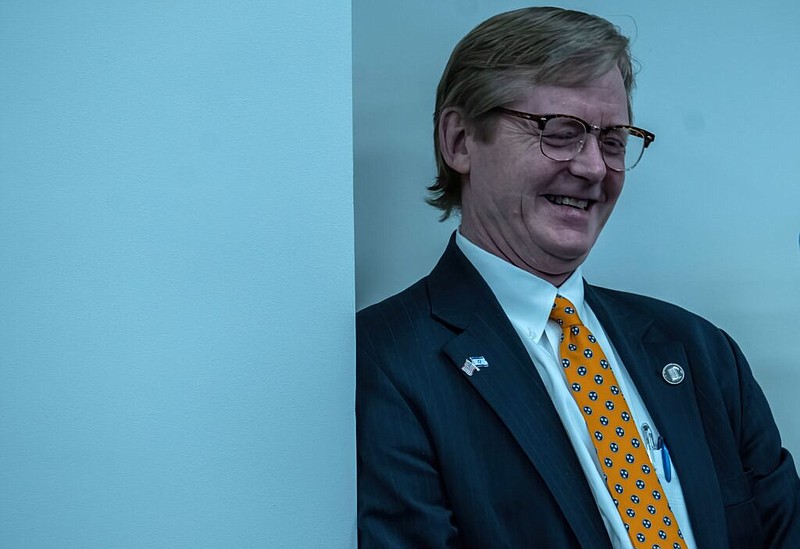After years of marijuana bills being kicked around the General Assembly, only to be booted, two lawmakers are hoping to find out what the public thinks about weed with a ballot initiative.
In a somewhat odd pairing, Rep. Bruce Griffey, a firebrand Republican from Paris, and Sen. Sara Kyle, a liberal Democrat from Memphis, are sponsoring the legislation.
The measure – Senate Bill 1973/House Bill 1634 – would require county election commissions to include three non-binding questions related to the legalization of marijuana on the 2022 ballot. The secretary of state would then compile the results and forward them to the legislature.
Griffey was unable to find any Republican senators who would sponsor the bill, which doesn't bode well for passage in the GOP-controlled body, but Kyle agreed to carry it in the upper chamber because she supports passage of each question it asks.
"To me, there's no downside to it, very minimal cost. Let the Tennessee voters at least express their opinion in an unbiased manner so all of us as legislators have a sense of what the voters would like us to do," Griffey said Wednesday.
The questions to be posed are: 1) Should the state of Tennessee legalize medical marijuana? 2) Should the state decriminalize the possession of less than 1 ounce of marijuana? 3) Should the state legalize and regulate the commercial sales of recreational marijuana?
The results of the ballot initiative would not guarantee passage of any follow-up legislation. Ballot measures aren't binding under the state's Constitution.
"We've been wrestling around with this for years and years now. A bunch of jurisdictions have taken a step to legalize it. There's certainly some valid arguments," Griffey said. "Is marijuana any worse than alcohol in certain situations?"
Davidson County District Attorney General Glenn Funk, for instance, made a practice of declining to prosecute possession of a half-ounce of marijuana or less, though police officers can write citations.
Funk's decision has drawn the ire of some of the state's more conservative lawmakers, who passed legislation last fall enabling the attorney general to appoint substitute district attorneys to handle cases when DAs announce they won't prosecute certain offenses.
(READ MORE: Hamilton County overdose deaths outpace state, federal increases)
Kyle, who has backed passage of medical marijuana in Tennessee for years, said she favors gauging "community support" for the questions.
"I would vote yes on every one of these," Kyle noted.
One of her main arguments is that people should have access to medical marijuana to deal with debilitating diseases. She points toward the prevalence of sickle cell anemia in her Memphis district and the benefits medical cannabis could provide to those suffering from it.
Previous legislation listed some 30 types of illnesses that medical marijuana could be used to treat. It also set up a state bureaucracy to oversee the growing, packaging and dissemination of the drug, all of which would have combined to create a massive industry and potentially reap billions in state revenue.
Kyle acknowledges any effort to legalize medical marijuana could be hampered by questions from lawmakers about the types of doses that could be administered. Yet she plans to forge ahead with the ballot initiative.
In addition, she believes thousands of young people are hampered by a DUI or marijuana possession conviction that holds them back from meaningful employment or admission to a school or college.
"Let's remove that barrier," she said. "We're talking about less than an ounce. That's pretty much personal use."
Kyle points out states across the nation allow the use of medical marijuana. In fact, Tennessee is in the minority, allowing only cannabidiol, commonly known as CBD.
In the region, Alabama, Mississippi, Arkansas, Florida and Louisiana allow medical marijuana, along with four others nationwide.
Kyle contends people who drive into Tennessee from Arkansas, where medical marijuana is legal, should not be penalized if found in possession.
North Carolina and Nebraska decriminalize possession of small amounts, and nine states, including Missouri, have legalized medical marijuana and decriminalized possession.
Eighteen states have legalized the use of marijuana completely, mainly in the western and northeastern parts of the country.
Only four states - Idaho, Wyoming, Kansas and South Carolina - completely outlaw the use of CBD and marijuana.
Based on previous surveys, Kyle believes Tennesseans are ready to legalize medical marijuana and to decriminalize possession of small amounts. Typical polls find public support between 70% and 80% for legalization of medical marijuana and decriminalization.
Kyle's main concern, though, lies with the General Assembly.
"On those questions, I think you'll get a high yes," she said. "But I don't know if the Legislature's ready."
Read more at TennesseeLookout.com.
